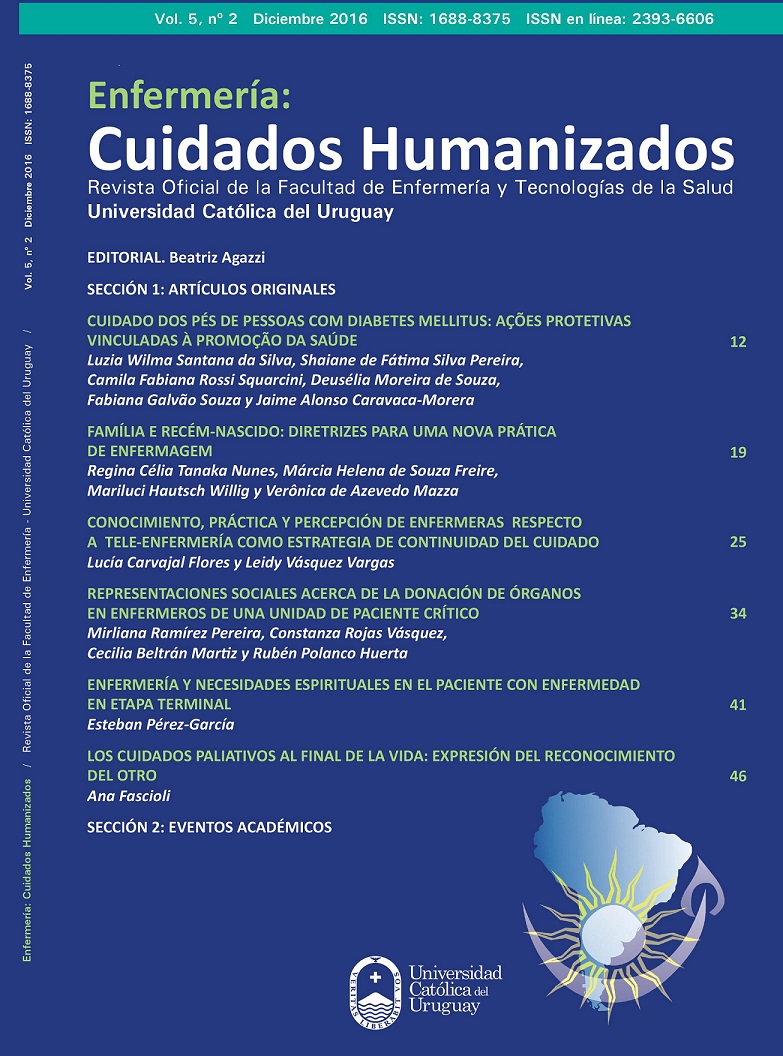PALLIATIVE CARE AT THE END OF LIFE: AN EXPRESSION OF THE RECOGNITION OF THE OTHER
DOI:
https://doi.org/10.22235/ech.v5i2.1288Keywords:
palliative care, right to die, recognition, hopice care, medical ethicsAbstract
This article offers an ethical-philosophical approach to palliative care at the end of life as an instance of recognition of the other. The proposal is that the ethical dimension of palliative care can be better understood using the concept of recognition of the other developed by the german philosopher Axel Honneth. We present and analyze the three spheres of intersubjective recognition proposed by Honneth as an interpretative framework of the ideal conditions of dignity associated with a “good death”.Downloads
References
Innerarity, D. Antropología del hombre paciente. La enfermedad como metáfora de la condición humana. En Anrubia, E. La fragilidad de los hombres. La enfermedad, la filosofía, la muerte, Madrid: Ediciones Cristiandad; 2008. p. 91-102.
Taylor, C. La política del reconocimiento. En Argumentos filosóficos, Barcelona: Paidós; 1996.
Honneth, A, Farrell, J. Recognition and Moral Obligation. Social Research. [Internet]. 1997 [citado Nov 2016]; 64 (1): 16-35. Disponible en: http://www.jstor.org/stable/40971157
Hunneth, A. Integridad y desprecio. Motivos básicos de una concepción de la moral desde la teoría del reconocimiento. Isegoría [Internet]. 1992 [citado Nov 2016], 5: 78-92. DOI: http://dx.doi.org/10.3989/isegoria.1992.i5.339
Honneth, A.La lucha por el reconocimiento. Por una gramática moral de los conflictos sociales. Barcelona: Crítica; 2007.
Anderson, J. Honneth, A. Autonomy, Vulnerability, Recognition and Justice. En Anderson, J y Christman. Autonomy and the challenges to
liberalism. Cambridge” Cambridge University Press; 2005. p. 127-149.
Cortina, A. Alianza y contrato. Madrid: Trotta; 2005.
Kellehear, A. A Social History of Dying. Cambridge; Cambridge University
Press; 2007.
Honneth, A. Recognition: Invisibility: On The Epistemology Of ‘Recognition’ Aristotelian Society Supplementary [Internet]. 2001 [citado Nov 2016]; 75: 111–126. DOI:10.1111/1467-8349.00081
Vanlaere, L. Tadd, W. Clarifying the concept of human dignity in the care of the elderly: a dialogue between empirical and philosophical approaches. Ethical perspectives, 17 (1): .253-281.
Habermas, J. Teoría de la acción comunicativa. Madrid: Taurus; 2003.
Díaz Berenguer, A. La medicina desalmada. Montevideo: Trilce; 2004.
Bernadá, M. et al. Abordaje del niño con una enfermedad pasible de cuidados paliativos. Archivos de Pediatría del Uruguay (81) 4. p. 239-247.
Imízcoz, T Contarse y curarse. Reflexiones sobre literatura y enfermedad. En Anrubia, E. La fragilidad de los hombres. La enfermedad, la filosofía, la muerte. Madrid: Ediciones Cristiandad; 2008. p. 103-124.
Sontag, S. La enfermedad y sus metáforas. Barcelona: Random House Mondadori; 2008
Leget, C. Borry, P. Empirical ethics: the case of dignity in end-of-life decisions. Ethical perspectives, 17 (2): 231-252.
Walker, S. Humane Dignity. En Leget, C. et all (Eds.) Care, Compassion and Recognition: An Ethical Discussion. Leuven Peeters Publishers; 2011 p. 163-181.
Downloads
Published
How to Cite
Issue
Section
License
Copyright (c) 2016 Enfermería: Cuidados Humanizados

This work is licensed under a Creative Commons Attribution 4.0 International License.

















